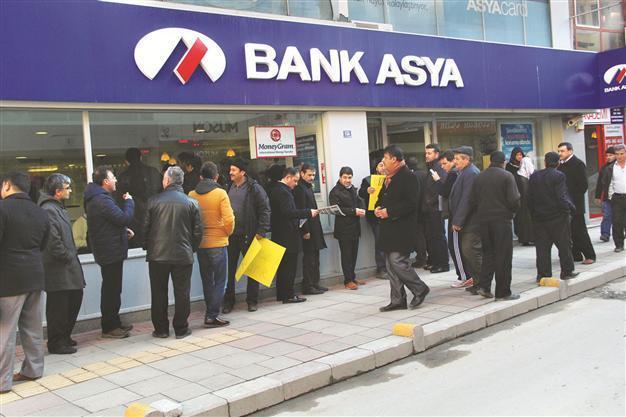Gov’t says Bank Asya decision judicial, while depositors flow to bank to show support
ANKARA/ISTANBUL

Many Bank Asya customers flow to the branches to show support. AA photo
The takeover of Bank Asya by the Turkish Savings Deposit Insurance Fund (TMSF) is entirely legal and judicial, but not political, Turkish Prime Minister Ahmet Davutoğlu said on late Feb. 4. Many people continued to show their support to the bank by putting money into their bank accounts Feb. 5, although some others were reported closing their bank accounts.
In an interview with a private television channel, Davutoğlu said the decision is fully compatible with banking law and there is no political motivation or directive behind the TMSF’s ruling.
“This is entirely a legal decision. It has no political aspect. It is not a decision taken with a directive,” he said. “And the legal aspects of this decision can be only examined on the basis of objective criteria.”
TMSF seized some 63 percent of Bank Asya shortly after the banking watchdog (BDDK) ruled in favor of its seizure on late Feb. 3. The BDDK said in a statement on its website that it seized the bank “because the institution has not presented a partnership structure that is transparent and open enough to allow for effective regulation.”
The watchdog appointed a new board of directors immediately after the seizure.
Many customers of the bank then reportedly deposited money into their accounts across the country, but others have reportedly closed their bank accounts.
A number of cabinet ministers also made statements on Feb. 4, saying the decision was the result of a technical decision based on banking regulation, although partners of the bank said in a television interview on Feb. 4 they had just needed more time to collect the documents asked for by the BDDK.
“We had asked for an extension to collect the documents, as we had many partners and it would take longer to collect the documents, which were supposed to include lots of data about the partners. Some of our partners were able to collect them, but some others couldn’t, due to the huge workload at the state administration units, courts and notaries at the end of the year, during which we were asked to submit the documents,” a top official of the bank said.
